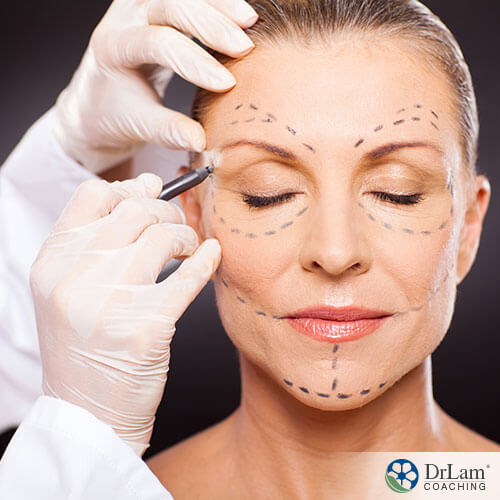 People opt for cosmetic surgery for many reasons. They may want a weight-loss reduction, fix their nose, or have a complete facelift to look younger. Whatever your reason, you need to know the risks of cosmetic surgery so that you can make an informed choice about having surgery.
People opt for cosmetic surgery for many reasons. They may want a weight-loss reduction, fix their nose, or have a complete facelift to look younger. Whatever your reason, you need to know the risks of cosmetic surgery so that you can make an informed choice about having surgery.
The issue with cosmetic surgery is that many people assume that these procedures are not as serious as ‘regular’ surgery. Nor do they understand the possible risks of cosmetic surgery. But all surgeries, no matter the type, has a certain element of risk involved. So, keep reading as we discuss some of these risks.
Let's first make the distinction between plastic surgery and cosmetic surgery. Cosmetic surgery is done to improve one's looks, while plastic surgery focuses on reconstruction. For example, this may be reconstructing the face after a serious accident or due to a birth defect.
However, no surgery is without risks. Yet some people are more susceptible to the risks of cosmetic surgery than others.
Your risks of cosmetic surgery increase if:
These factors may increase your chances of developing complications. If you suffer from adrenal fatigue, then you should inform your surgeon.
The risks of cosmetic surgery may seem wide and varied. They include:
 While most risks of cosmetic surgery refer to possible negative external outcomes, there are also internal risks.
While most risks of cosmetic surgery refer to possible negative external outcomes, there are also internal risks.
Any type of surgery puts stress on your body. This then activates your NeuroEndoMetabolic (NEM) stress response. All of your body's systems are affected, including your hormones, gastrointestinal function, and more. It is important to ensure that your body can handle the stress of surgery before opting for one. The last thing you need while recovering from surgery is to undergo a crash.
The use of fillers during surgery may also affect your NEM, especially in the long term. This is because your body may react to the filler’s housing. Also, if there is a leak, then the contents of the fillers may result in an adverse reaction.
If the surgery leaves foreign material inside your body, this could affect you in the long-term. It may take years before you start showing any symptoms relating to your NEM response. You may not be aware of the growing consequences associated with such material. Eventually, a dysregulation in your internal systems may result in problems that are not commonly associated with the risks of cosmetic surgery.
According to the American Society of Plastic Surgeons (ASPS), approximately 18 million Americans underwent some sort of cosmetic procedure in 2017. According to the ASPS data, the top five cosmetic surgical procedures for that year were breast augmentations, liposuction, nose reshaping, eyelid surgery, and tummy tucks.
In the case of minimally invasive procedures, Botox, fillers, chemical peels, laser hair removal, and microdermabrasion made the top of the list.
This begs the question: Why do people choose to undergo cosmetic surgery?
The answer, unfortunately, is not simple. Instead, it is one that is deeply personal. Each person’s reasons are different.
The most common reasons for cosmetic surgery include:
Being a good candidate for this type of procedure may reduce the risks of cosmetic surgery. This implies that you are someone who has done their homework, who knows the risk factors, and who has realistic expectations.
A good candidate is also someone who has no health issues like diabetes, obesity, allergies, cholesterol issues, autoimmune disorders, and so on. You should also follow a healthy diet and lifestyle. This means that you should be someone who is emotionally stable, does not smoke, gets regular exercise, and limits both your coffee and alcohol intake.
Knowing the risks of cosmetic surgery gives you an advantage. You could reduce the possibility of a bad outcome by taking the necessary steps to ensure you are in good health before the procedure. If this means stopping your smoking habit, or joining a gym and getting fit, then this may be what you need to do. At the same time, following a healthy, balanced diet both in the period before and after surgery may go a long way towards ensuring a positive result.
You should carefully choose the professional to conduct your procedure. Make sure that you see examples of their work, and they should be experts in your procedure (or similar ones). They also need to be board certified, so do not be afraid to ask as many questions as possible.
Make sure the person doing the procedure is approachable and makes you feel comfortable. Their personality may have nothing to do with the outcome, but at least you should be comfortable enough to ask them questions.
Lastly, make sure the person doing your anesthesia is qualified to do so. Do as much as you can to eliminate possible errors during your procedure.
 While your reasons for considering cosmetic surgery may be personal, the risks of cosmetic surgery are largely the same as any other surgery. Therefore, you must do your homework about all the possible options.
While your reasons for considering cosmetic surgery may be personal, the risks of cosmetic surgery are largely the same as any other surgery. Therefore, you must do your homework about all the possible options.
This homework is not only about the surgical professionals or the facility where the procedure occurs. It also means knowing everything that could go wrong and making informed choices. You should also consider your general health, diet and lifestyle. By addressing your risk factors pre-surgery, you may aid in the procedure’s success and your quick recovery.
Knowing the various risks of cosmetic surgery, wouldn't you also like to discover how these risks could further impact your adrenal function?
© Copyright 2021 Michael Lam, M.D. All Rights Reserved.
Yes, the risks of cosmetic surgery could affect your adrenal function under certain circumstances. This would typically be the case of a challenged immune system and inflammatory response. To ensure the best outcome, follow a balanced diet, be relatively fit, and be in good health before undergoing a procedure.
